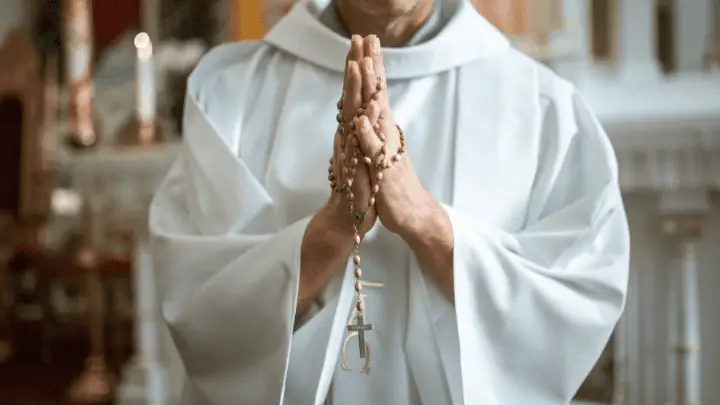Yes, priests do get paid for their services, although the specifics of their wages vary from church to church and state to state.
However, there is much-heated debate surrounding the topic of priests being paid. Some people feel priests should be paid for their services, as they put in a lot of work.
Other people feel that giving priests pay would go against the principle of free will, which is at the heart of Christianity.
But, most priests in the United States get paid by the church.
Hence, they receive a salary, retirement benefits, and other compensation from the organizations that fund their services.
What is a Priest?
Priests are people who help us connect to the divine. They represent God on earth and help us understand our place in the world.
A priest can offer guidance, comfort, and forgiveness when we need it most. Priests are often responsible for leading services and preaching on behalf of their church or congregation.
They also may be involved in charitable work and counseling individuals about religion, morality, and other topics.
What Does a Priest Do?
Priests serve as conduits between God and humanity, linking the spiritual realm with the physical one.
Priests offer guidance to their congregations by voice, pen, or hand to nudge people closer to understanding their brief time on Earth and what lies beyond.
In a way, they can be seen as teachers or counselors. They can guide you to find happiness, peace, satisfaction… anything important to you.
A priest plays an essential role in societies around the world. A priest also counsels people and helps them find prayers that speak to their hearts and needs.
Priests often work tirelessly for social justice while ministering to individuals within religious institutions, hospitals, and other healthcare facilities.
If you ever have questions about your faith or spirituality, there’s no better person to turn to than a priest.
What are the Benefits of Being a Priest?
1. Being a priest is a spiritually enriching experience
Being a priest is more than simply fulfilling an obligation. It is also an enriching experience that allows one to connect with their spiritual side and become closer to God.
Priests can minister on Sundays and during weekdays through prayer services or Masses.
In honoring their biblical mandate, priests teach the Word of God to help people understand who they are and what matters most in life.
2. Being a priest is a position of trust and authority
A priest is a person who has been given the trust and authority to represent God in people’s lives.
This position of authority comes with a lot of responsibility, one of which is listening closely to those seeking guidance from on high.
Priests are entrusted with such an important task, so their knowledge and values should be shared so those listening can see themselves reflected in them.
3. Being a priest provides opportunities for service to others
Service to others is one of the core values that priests, especially Roman Catholics, embody.
As members of a spiritual hierarchy, priestly vocation provides many opportunities for service and ministry within the church community and beyond.
Priests have traditionally served as educators, pastors, counselors, caretakers, healers, and more – any role that can bring joy or help others in need.
At its best, this revolves around moments when priesthood touches not just life but also death.
They help those facing tragedies deal with their losses while providing hope during challenging times.
4. An obligation to live according to moral principles
Being a priest is an obligation to live according to moral principles. A parish priest must act per the Catholic religion’s teachings on morality and ethics based on scripture and church tradition.
Behaving ethically means doing what is right, even when it may be difficult or unpopular.
Priests are expected to uphold high standards of personal conduct, especially when interacting with public members.
They should always respect others and refrain from behaving rudely or vulgarly during their ministry.
5. Priests provide guidance and support for people of all backgrounds
Being a priest comes with many responsibilities. One of the most important is providing guidance and support for people from all backgrounds.
Someone given this privilege must use their knowledge and experience to help others in any way possible.
It’s their job to help people find their way back home, no matter how hard it may be.
What are the Requirements to Become a Priest?

1. Education and theological training
Every priest needs education and theological training to serve his parishioners effectively.
Priests need to have a foundation in secular and sacred knowledge to provide pastoral care from the heart rather than based on dogma or tradition alone.
Most churches worldwide agree that an education in theology and/or a recognized priesthood program are necessary ingredients for ordination.
2. Good moral character
There is a reason that good moral character is one of the requirements to become a priest. A priesthood places great emphasis on virtue and morality, two concepts that are closely linked.
Good moral character defines who we are as individuals and how we behave in the world.
As a result, we learn to be honorable and upright and are encouraged to act positively toward others.
Becoming a priest requires more than just essential intelligence or exceptional talent.
There must also be integrity, compassion for others, self-discipline, and a deep understanding of life’s purpose.
Good moral character allows you to live up to temple teachings emphasizing morally sound decisions grounded in faith.
3. Have a sense of calling to serve others
When people think about becoming a priest, the first thing that may come to mind is carrying out religious services or leading congregations of faithful worshipers.
The requirements for ordination as a priest are much more than simply being able to do these things well; they include having what has traditionally been called “a calling.”
This refers to an innate and personal sense of purpose or mission in life which impels one towards noble pursuits.
To fulfill this calling and thrive in it, priests require other qualities such as humility, discipline, focus, and self-sacrifice.
Do Priests Get Paid?
Priests make a considerable of money. Across the United States, priests earn an annual average salary of about $57,000.
Most American priests receive at least partial reimbursement for their expenses while ministering within their denomination or priestly ordination society.
On top of this income, many priests also receive payment from their dioceses, which can add to significant earnings totals.
What is the Job Outlook for a Priest?
Priests traditionally have good career prospects because they are needed to serve both religious and secular needs within society.
Priests can work in various settings, including parishes, schools, hospitals, charitable organizations, or even as chaplains to military personnel.
Outside of traditional church ministry, opportunities include becoming a consultant or facilitator helping various groups develop their communication strategies.
FAQs
Do priests need any particular skills?
No essential skills are needed to be a priest, though some specific abilities and qualifications may be helpful.
For example, priests need strong communication skills, leadership skills, and the patience and discipline necessary for ministry.
Do priests have to be virgins?
No, priests don’t have to be virgins. No prescribed rule or law requires priesthood holders to abstain from sexual intimacy before ordination.
However, within the catholic church, celibacy is an integral part of the role of a priest.
Do priests pay taxes?
Regarding taxes, priests are like most other citizens who get paid. Priests have to pay the tax that is legally required of them, no matter what their religious beliefs may be.
What is the age limit to become a Catholic priest?
There is no specific age limit to becoming a Catholic priest, as the decision to enter into priesthood training is ultimately up to the individual.
However, most participants in priesthood training are between 17 and 55 years old when they enroll in school or seminary.
Final Thoughts
Priestly income is a matter of much debate. Priests in the United States do usually receive some type of monetary compensation for their work.
However, this is not always the case. Some churches do not have a paid clergy and instead rely on donations from the public to support their churches.
There are many different models and ways that this compensation is granted so it can vary significantly from church to church and diocese to diocese.
Learn more about parochial schools.
Thanks for reading.






